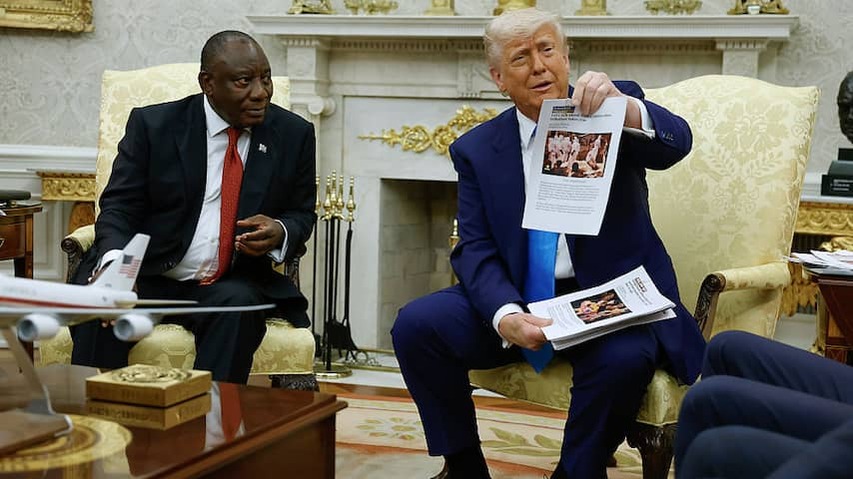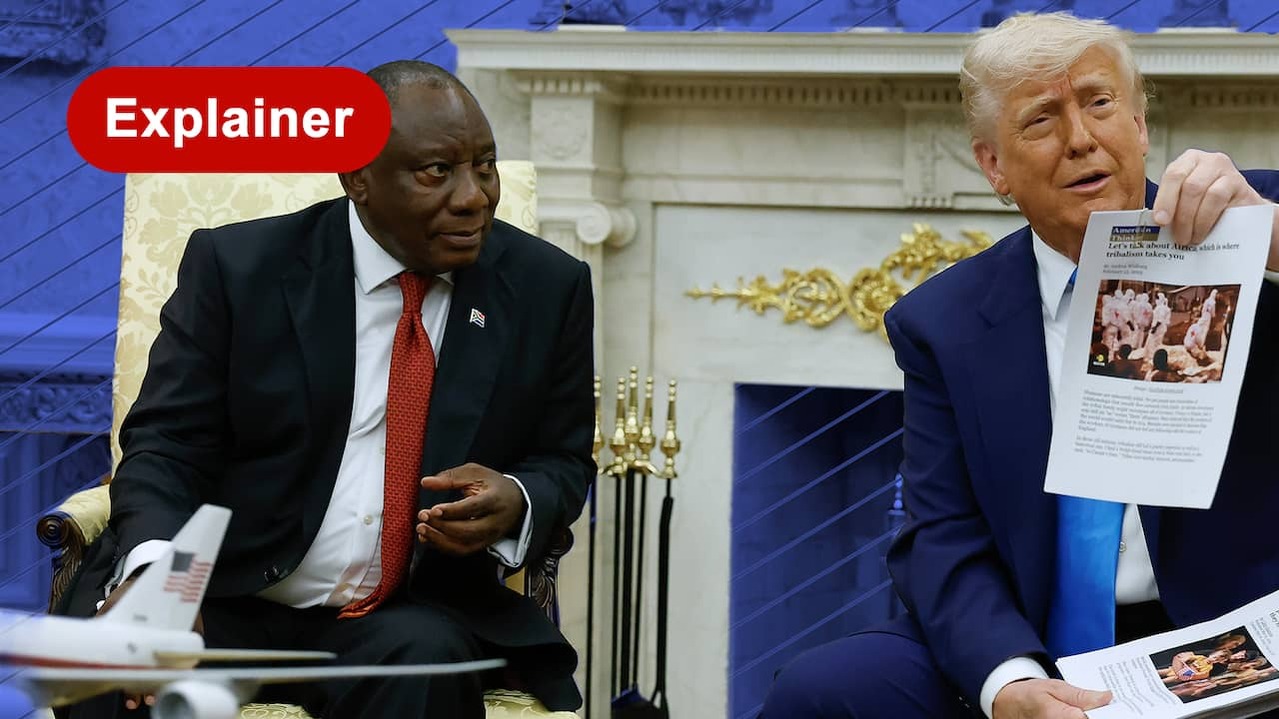
The South African president Cyril Ramaphosa was surprised on Wednesday by his American counterpart Donald Trump with claims about white farmers. They would be dispossessed, persecuted, and murdered. There is little to no truth to that, nor to claims that South Africa is committing genocide.
“Look, cemeteries. Graves. Of more than a thousand white farmers,” Trump lamented as he displayed images of numerous white crosses along the side of a road. But that is not true: the images were from South Africa in September 2020. From a local memorial event after the murder of a couple on their farm a month earlier. There were no graves.
But to reinforce his complaint, Trump presented recent newspaper clippings of alleged violence against white farmers in South Africa, as seen in the photo accompanying this article.
These farmers, mostly descendants of Dutch colonists, have been on the radar of the American president for several years. He and his supporters claim that white farmers are being greatly wronged, even to the point of accusations of genocide.
Trump has been harping on unproven claims since 2018 from, among others, Fox News that President Ramaphosa is forcibly expropriating land from farmers in South Africa because they are white. “Racism,” said then-presenter Tucker Carlson. Trump has recently been supported by Elon Musk, who was born in South Africa.
 2:32
2:32
Fact check of trump’s images: This is what the president of South Africa had to see
South African Government Cannot Simply Expropriate
There is indeed a law that would allow the South African government to expropriate landowners, even without offering compensation. But that is only possible under very specific circumstances, for example, if it is in the public interest to expropriate. Think of land that remains fallow, while food could be grown. The United States applies a similar principle in expropriation.
There are (yet) no known cases where the South African government has actually appropriated land without offering compensation. Moreover, the decisions can be challenged in court.
The introduction of such a law in South Africa is understandable from a government perspective. The country is dealing with the legacy of almost a century and a half of racist apartheid policies. This excluded the black population from land ownership through various laws. That still has consequences.
Until a few years ago, white farmers owned more than 70 percent of the agricultural land, while they only make up about 7 percent of the population.
President Ramaphosa admitted in 2018 that plans for land reform and expropriation include the fact that the “black population wants its land back.” Shortly after the law was passed earlier this year, the US cut all financial aid to South Africa.
What is apartheid?
The term apartheid refers to the period between 1948 and 1990. At that time, discrimination and racism were government policy in South Africa.
The black population had to live separately from the white population. That was only possible in small areas, the so-called homelands.
Moreover, the black population lost its South African nationality. As a result, they could not travel freely. The black population was also excluded from good jobs. In addition, they were not allowed to use the same public facilities as the white population.
Violence Against White Farmers is Decreasing
According to Trump and like-minded people, white farmers in South Africa are also increasingly the victims of (lethal) violence, especially during expropriations. There is no evidence for the latter claim.
Figures show that violence against white farmers has decreased in the last 25 years. In 1997/1998, according to Quartz magazine, there were 153 murders on farms.
The New York Times reports, based on information from the South African police, that between April 2020 and March last year, 225 people were murdered on farms. In 101 cases, it concerned employees, who are usually black. In 53 cases, it concerned the farmers themselves, who are usually white.
Looking at the whole of 2024, according to news agency Reuters, again based on the South African police, there were 44 murders on farms. In eight cases, the farmer himself was killed. That is tragic, but at the same time there were 26,232 murders in South Africa last year. In 0.03 percent of the cases, it concerned white farmers.
That did not stop Trump from welcoming a group of about fifty white South Africans in the US earlier this month as refugees. This would be necessary because of the so-called “ongoing genocide” on the farmers, the violence, and the expropriations.
Even White Farmers Are Not Happy With Unproven Genocide Claims
But according to experts, there is no genocide against white farmers in South Africa at all, as Trump claims. For example, it is unclear whether there was a racist motive in all cases of murder.
The South African government concluded a few years ago that incidents with fatal outcomes usually started as robberies, partly because of the persistent poverty and inequality in the country. According to sociologist Anthony Kaziboni of the University of Johannesburg, the fact that many farms are located in remote areas and are therefore a relatively easy target also plays a role, reports Factcheck.org.
Also, not everyone within the white farming community in South Africa believes that the incidents can be described as genocide, reports Deutsche Welle. Kaziboni also states that it is completely inappropriate to describe the violence against white farmers as genocide, especially given the United Nations’ definition of genocide.
Ramaphosa therefore immediately rejected Trump’s suggestion. “If there was genocide, these gentlemen would not have traveled with me,” the president said, pointing to his white delegation members.